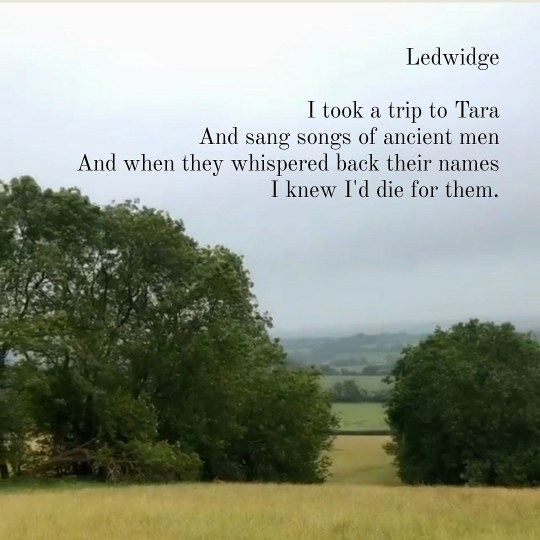#WWi poets
Text
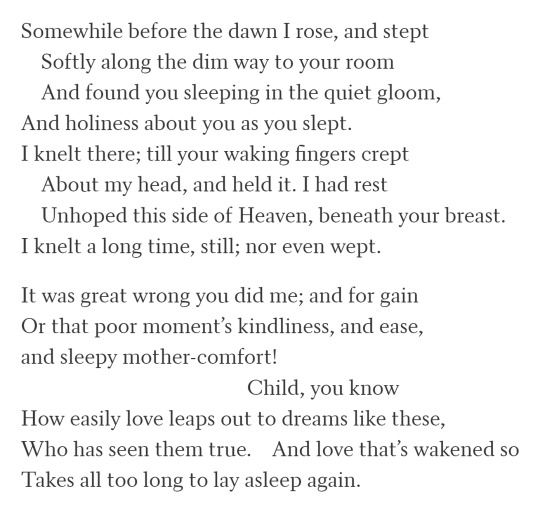
"A Memory" by Rupert Brooke (1887-1915)
via poets.org
#rupert brooke#poetry#love poem#love poetry#literature#literature quotes#1910s#english poetry#20th century#20th century literature#20th century poetry#wwi poets#e
3 notes
·
View notes
Text
The Last Meeting
We who are young, and have caught the splendour of
life,
Hunting it down the forested ways of the world,
Do we not wear our hearts like a banner unfurled
(Crowned with a chaplet of love, shod with the sandals
of strife)?
Now not a lustre of pain, nor an ocean of tears
Nor pangs of death, nor any other thing
That the old tristful gods on our heads may bring
Can rob us of this one hour in the midst of the years.
—Geoffrey Bache Smith, Spring Harvest (ed. J.R.R. Tolkien)
#Geoffrey Bache Smith#g b smith#gb smith#g.b. smith#spring harvest#wwi poetry#WWi poets#tcbs fellowship#t.c.b.s. fellowship#tolkien and the great war#Tolkien’s friends who died in WWI
1 note
·
View note
Text
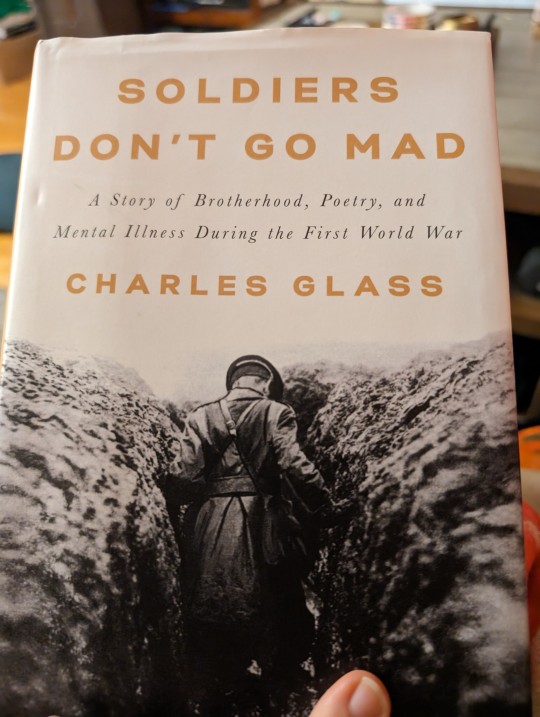

#currently reading#bookworm#world war 1#wwi#ww1#wilfred owen#siegfried sassoon#hey look! a dead gay poet with complicated feelings about nationalism!#books#the great war#ptsd#shell shock#combat ptsd
81 notes
·
View notes
Text
"If you could hear, at every jolt, the blood / Come gargling from the froth-corrupted lungs, / Obscene as cancer, bitter as the cud / Of vile, incurable sores on innocent tongues,— / My friend, you would not tell with such high zest / To children ardent for some desperate glory, / The old Lie: Dulce et decorum est / Pro patria mori."
Read it here | Reblog for a larger sample size!
#great poem but why on earth did he put an em dash directly after a comma#mr. owen i just want to talk#closed polls#polls#poetry#poems#poetry polls#poets and writing#tumblr poetry#have you read this#dulce et decorum est#wilfred owen#war poetry#wwi
30 notes
·
View notes
Text



hah I knew you were a bloodthirsty bitch
#I'm actually really in love with his repression#taking this with his own comments on The Kiss#and The Poet As Hero#he intellectually objects to his own bloodlust#which is admirable!#but still it lurks in his righteous imaginings like in blighters#siegfried ''I'm killing you with hammers'' sassoon#that got a bit long.#idk this is still experimental thinking#siegfried sassoon#wwi
29 notes
·
View notes
Text

Remembering Canadian poet-physician John McCrae, born 150 years ago today (Nov. 30, 1872) in Guelph, Ontario. McCrae earned immortality with his 1915 poem In Flanders Fields, perhaps the best-known English-language poem to emerge from the First World War. He died of pneumonia on Jan. 28, 1918.
(Photo: John McCrae in uniform, ca. 1914; photographer unknown. Now in the collection of the Guelph Museums.)
62 notes
·
View notes
Text
Days of 1923
The sole survivor of his graduating class,
recipient of the Iron Cross, and morphine
addict, Bruno contemplates the void.
Eggs cost ten billion marks these days, and bread
a hundred billion. He’s considered drinking
his paints, just like Van Gogh, but only because
the water’s been shut off. And who needs art
now anyway? What is there to be said
after the trenches and the mustard gas,
bits of intestine dangling from tree branches,
boys with their jaws blown off, the screams of shells
that nightly thunder in his rented room?
The landlord’s Jewish, Bruno thinks, and scowls.
And never mind that so’s his friend, who served
beside him in the company of lancers
and saved his skin in no man’s land three times.
8 notes
·
View notes
Text
okay the poet dean fic was bad but beat sheet is incredible. i started reading it this morning without looking at the chapter count and i got so giddy i had to check, thinking i was almost done, but in fact there are 9 chapters of like 100k more words to go
#i'm glad this is living up to the hype because poet dean fic reallyyyyy let me down#i was willing to try to move past making jack sam's kid#but i had to quit when it said that cas - as an english professor - didn't know tolkien was from the wwi era#that completely broke my suspension of disbelief like he may as well have been a physics prof who didn't know oppenheimer invented the bomb
2 notes
·
View notes
Text


One of England's most eloquent WWI poets is seldom heard of today
#Robert Graves#WWI#Captain#British Army#wartime poet#English literature#British authors#trauma#poetry#uniform
44 notes
·
View notes
Text
“They”
The Bishop tells us: “When the boys come back
They will not be the same; for they’ll have fought
In a just cause: they lead the last attack
On Anti-Christ; their comrades’ blood has bought
New right to breed an honourable race,
They have challenged Death and dared him face to face,”
“We’re none of us the same!” the boys reply.
“For George lost both his legs; and Bill’s stone blind;
Poor Jim’s shot through the lungs and like to die;
And Bert’s gone syphilitic: you’ll not find
A chap who’s served that hasn’t found some change.”
And the Bishop said: “The ways of God are strange!”
- “They” by Siegfried Sassoon, 31st October 1916
#siegfried sassoon#ww1#poetry#writers and poets#ww1 poetry#from the collection The War Poems#arranged by Rupert Hart-Davis#wwi
7 notes
·
View notes
Text
Siegfried Sassoon: Sketch (2) 2023
One of my favorite War Poets, Siegfried Sassoon at first an enthusiastic soldier, soon became disillusioned with the horror and futility of the fighting on the Western Front. His younger brother Hamo died in 1915 at Gallipoli and this loss no doubt profoundly contributed to his change of heart. Here is my portrait of Siegfried Sassoon and his poem: Glory of Women, written in 1917. It is a…
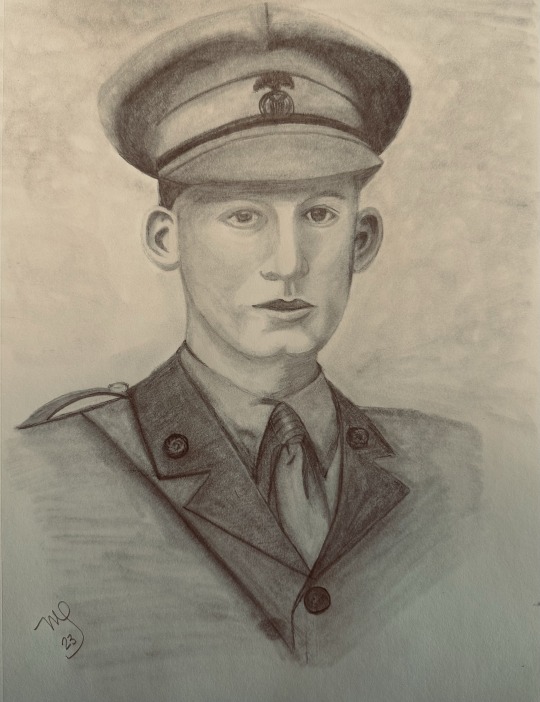
View On WordPress
4 notes
·
View notes
Photo
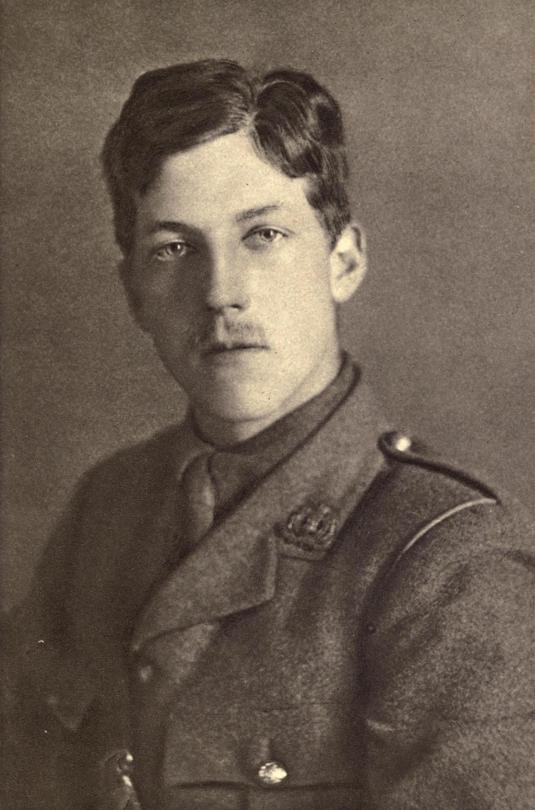

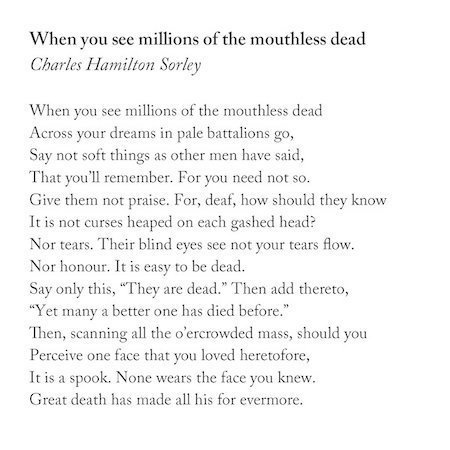
The Scottish war poet Charles Sorley was born on May 19th 1895 in Aberdeen.
Born Charles Hamilton Sorley at Powis House , he was the son of philosopher and University Professor William Ritchie Sorley. He was educated at King's College School, Cambridge, and then like Siegfried Sassoon, at Marlborough College. At Marlborough College Sorley's favourite pursuit was cross-country running in the rain, a theme evident in many of his pre-war poems, including Rain and The Song of the Ungirt Runners. In keeping with his strict Protestant upbringing, Sorley had strong views on right and wrong, and on two occasions volunteered to be punished for breaking school rules.
Sorley was due to take up a scholarship at University College, Oxford, in the autumn of 1914, so with the agreement of parents and schoolmasters, he left Marlborough in December 1913 to spend a few months abroad, in Germany, which proved to be a happy time for him. Plans for a last walking week in the Moselle were interrupted by declaration of war, and he and a friend were briefly arrested before making their way back home.
The morning after his arrival home, notwithstanding his new admiration for the German people, he applied for a commission, which was forthcoming in the Suffolk Regiment. The regiment went to France the following year, in May 1915, and by September Sorley had been made a Captain. His battalion was moved to take part in the Battle of Loos, taking position at the front line on the night of the 12th October. Sorley was killed in action the next day.
A collection of Sorley’s poetry was published posthumously as Marlborough and other Poems and went through six editions in the first year. Because of his time in Germany, Sorley’s attitude toward the war was deeply conflicted from its start. His small body of poetry is ambivalent, ironic, and profound. Sorley has been described as “one of the three poets of importance killed during the war,” the others being Wilfred Owen and Isaac Rosenberg. His other works include The Collected Poems of Charles Hamilton Sorley.
Rooks.
There, where the rusty iron lies,
The rooks are cawing all the day.
Perhaps no man, until he dies,
Will understand them, what they say.
The evening makes the sky like clay.
The slow wind waits for night to rise.
The world is half content. But they
Still trouble all the trees with cries,
That know, and cannot put away,
The yearning to the soul that flies
From day to night, from night to day.
15 notes
·
View notes
Text
They're wraiths, all of them. They aren't people. God knows what they've done with their realities. - Robert McAlmon
#Robert mcalmon#quotes#1920s#writers#writing#flappers#postwar#wwi#the lost generation#the bright young things#classic literature#poets
23 notes
·
View notes
Quote
You always were for sides, your hand
Rose to the shock of partisan blows;
And now, at ease in No Man's Land,
You sprawl between your friends and foes.
The carved mouth and the challenging eye,
Your loud scorn and your quiet faith
Who would believe that you would lie
In the anonymous ranks of death!
I wonder how you take your rest,
Whose restless vigor tossed and burned;
And do you find earth's stony breast
Warmer than those from which you turned?
Are you content with this, the goal
Of all your purposes and pains;
Knowing the iron in your soul
Will not corrode, for all the rains?
An end to questions now. You are
Their silent answer on this red
Terrain, where every flickering star
Sets a last candle by your bed.
The guns are stilled, and you are part
Of the clean winds that smooth your brow.
O vigilant mind, O tireless heart,
Try sleeping now.
On The Field of Honor, by Louis Untermeyer. As featured in The Liberator, August 1918 editon.
#poetry#poem#poet#Antique#antique magazine#antique magazines#vintage#vintage magazine#vintage magazines#american poets#American poetry#american poem#fallen soldier#fallen soldiers#No Man's Land#soldier#war#world war one#wwi
6 notes
·
View notes
Photo
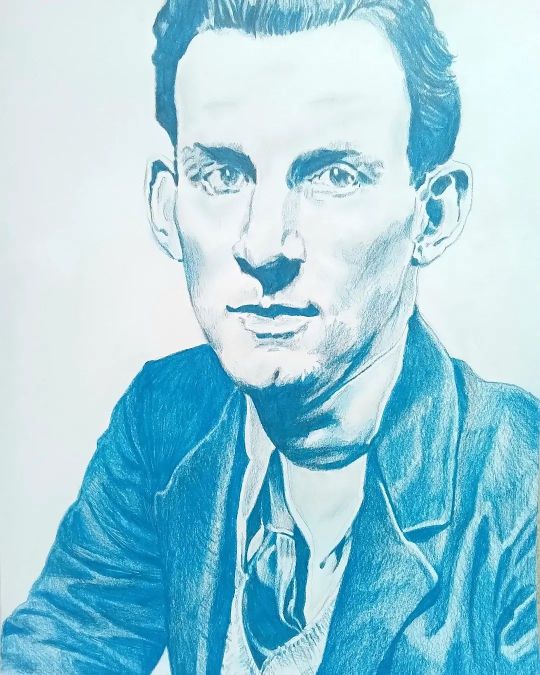
Portrait of poet and author Siegfried Sassoon (1886-1967). One of the most notable War Poets, Sassoon, who had multiple received multiple decorations for his bravery during WWI, took a strong stand against the war in his literary work. During and after the war, he became a major literary figure and was friends with many great authors and artists, from the Bloomsbury Group and beyond. His fascinating relationship with Stephen Tennant was very intense and painful (especially for Sassoon, I guess). I am looking forward so much to get the opportunity to watch Benediction, the newest film of the great @terencedaviesofficial - it's all about Sassoon AND made by one of my favorite filmmakers, so I just can't wait. (When will it be released in Belgium, I wonder...?) #siegfriedsassoon #warpoet #poet #literature #queerauthor #wwi #terencedavies #benediction #stephentennant #bloomsburygroup https://www.instagram.com/p/CfbFhcmtU_z/?igshid=NGJjMDIxMWI=
#siegfriedsassoon#warpoet#poet#literature#queerauthor#wwi#terencedavies#benediction#stephentennant#bloomsburygroup
5 notes
·
View notes
